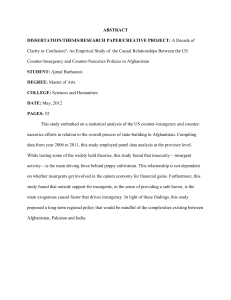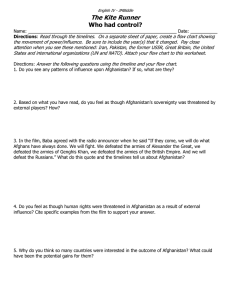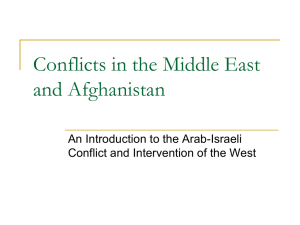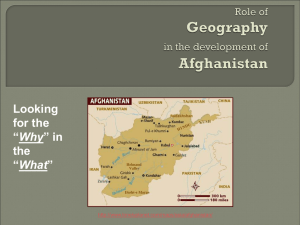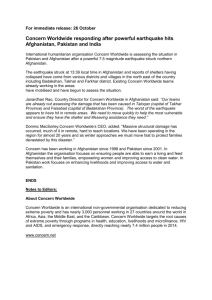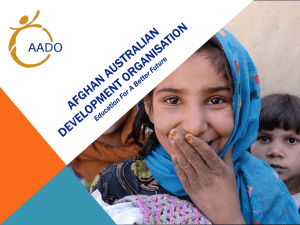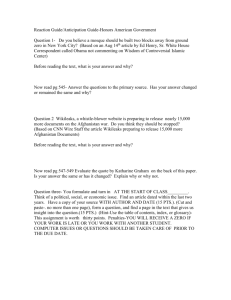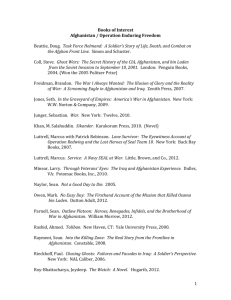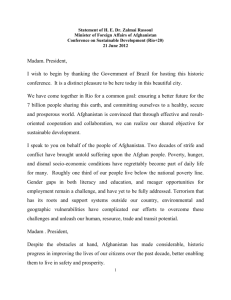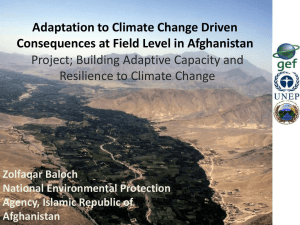Economics.Unit 2.Notes
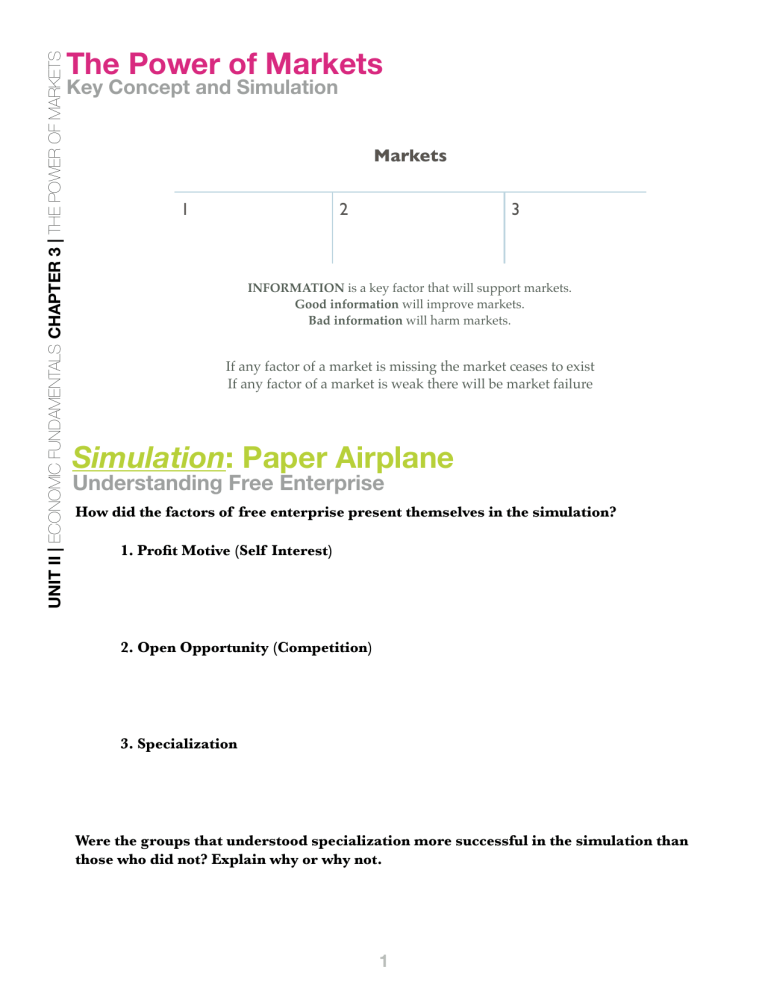
The Power of Markets
Key Concept and Simulation
1 2 3
INFORMATION is a key factor that will support markets.
Good information will improve markets.
Bad information will harm markets.
If any factor of a market is missing the market ceases to exist
If any factor of a market is weak there will be market failure
Simulation : Paper Airplane
Understanding Free Enterprise
How did the factors of free enterprise present themselves in the simulation?
1. Profit Motive (Self Interest)
2. Open Opportunity (Competition)
3. Specialization
Were the groups that understood specialization more successful in the simulation than those who did not? Explain why or why not.
1
ECONOMIC FUNDAMENTALS
An Afghani farmer weeds the thistles from his field by hand, protecting himself from the sharp spines with a piece of leather, oblivious to the rugged splendor of the surrounding landscape.
A COMMON MISNOMER for economic systems is that each is linked specifically to a form of government. If we break ideas down to their simplest form a government will choose an economic system according to how they address the following three (3) questions.
The three economic questions are
1.
2.
3.
The financial result of the three economic questions is:
_______________________ are the income people receive for supplying factors of production
Landowners receive _______ (LAND) Workers receive _______ (LABOR/CAPITAL)
Entrepreneurs (investors/banks) receive ____________________
How do Afghani’s answer the three economics questions according to the article provided?
(reverse)
Land Labor Capital
1 acre
56 worker hours
Hand tools
1 acre
56 worker hours
Hand tools
2
Result
Case Study : Afghanistan’s Drug Boom
by Michelle Alloit-Marie from the Washington Post
October 6, 2006
Yet despite the efforts of other nations and the reinforcement of deployed forces as the election approaches, one issue is particularly worthy of attention: the noticeable increase of narcotics production since 2002 and its geographical expansion in Afghanistan. Altogether,
28 of the country's 32 provinces are apparently producing opium, and employing more than 1.7 million people at this work. According to the United Nations Office on
Drugs and Crime, opium production in Afghanistan in
2003 amounted to about 3,600 tons -- that is to say, threequarters of world production -- over 200,000 acres of cultivated land. More then 90 percent of the heroin arriving in France comes from Afghanistan. An even larger harvest is expected for this year as traffickers stock up to protect themselves against a reaction from the international community. Not only do these narcotics flood the global drug market, with serious consequences for public health, particularly in Europe, but their production is impeding Afghanistan's stabilization.
Warlords are taking advantage of trafficking, and they are protecting it. The narcotics-related financial networks are fed by particularly powerful underworld groups that undermine authority and the rule of law.
"No-go" areas that foster crime are developing. At the same time, the money generated by trafficking makes it possible to fund attacks by the Taliban fighters still in the area. In fact, there is little doubt that drug money is funding terrorist activities. And 10 percent of the heroin produced in Central Asia is consumed locally, creating a public health problem for Afghanistan that must be confronted rapidly.
The farming of poppies and drug trafficking in general are damaging the area's economic development.
And economic progress is a prerequisite for reestablishing stability in the country. Confronted with this situation, Afghan President Hamid Karzai has made drug production and trafficking illegal. Last
January his government created a special force for counter-narcotics efforts. Nonetheless, the scale of the problem demands a sizable response that goes beyond local resources and capabilities.
Like the international community, France is concerned about narcotics and is willing to help. We will need to take advantage of the post-election dynamics to act quickly and help Afghanistan combat this problem. A first step will be to reinforce the training programs of the
Afghan police, to improve the judiciary system and to strengthen the disarming, demobilizing and reintegrating process. A second will be to encourage measures aimed at closing down and prohibiting poppy-processing laboratories.
But this will not be enough. It will be necessary to establish an international force, other than the ISAF, specifically tasked with counter-narcotics operations. And a third axis is necessary, one which would support the development of substitute crops on a local basis. There are many signs that production can be controlled if there is efficient action on the main issue: the poverty of small farmers. Traditional food crops (wheat, corn, etc.) can offer a viable alternative. The U.N. World Food Program has offered to help Afghanistan investigate new markets, such as nuts and grapes. Along with new irrigation systems, several tree nurseries should be renovated to meet the increasing demand for plants. All these initiatives must be encouraged. Moreover, the international community must promise that its members will purchase the crops.
At the same time, we must involve neighboring countries, taking into account the cross-border aspect of the drug scourge.
The international community needs to operate cohesively and to display a fierce determination to succeed. France is committed to help Afghanistan in this political transition phase, beyond the election.
The involvement of our forces not only in the ISAF but also in counterterrorism through Operation Enduring
Freedom and in the training of Afghan troops remains highly beneficial.
But I also believe that, in Afghanistan as elsewhere, counterterrorism must be global, and this encompasses the links between narcotics, money and terrorism. This is a war that must be fought on all fronts, a war in which
France will be involved without reservation.
3
ECONOMIC SYSTEMS
People acting individually or collectively through government, must choose which methods to use to allocate different kinds of goods and services
Traditional
Economy
Centrally
Planned
Economy
Market
Economy
Mixed Economy
An economic system that relies on habit, custom, or ritual to decide questions or production and consumption of goods and services.
BARTERING -
In a Centrally Planned
Economy the central government alone decides on the production and consumption of goods and services
Often confused with
____________________
A __________________ is a type of CPE where supply and price are regulated by the government.
An economic system in which decisions on production and consumption of goods and services are based on voluntary exchange in markets.
VOLUNTARY
EXCHANGE -
A combination of two or more economic systems (traditional, centrally planned, and market)
Examples of Markets
4
